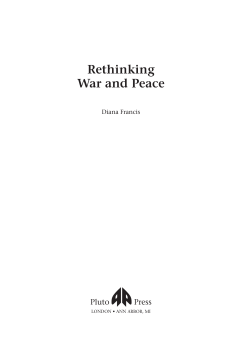
Additional Information
Book Details
Abstract
Is war ever a just way to resolve conflict? Diana Francis argues that it is not. With passion and eloquence, she mounts a head-on challenge to the belief that war as an institution is either necessary or effective for good.
Refuting the notion that human nature condemns us to perpetual carnage, she argues that we can change the ways we think and the systems we live by. In a tightly reasoned discussion of the ethics of war and peace she asserts that war is a gross denial of the core values on which peace depends, and that the Just War Theory has failed and deceived us.
The book explores alternative ways of confronting aggression and injustice, showing that these are neglected but well proven. Francis argues that our security can be enhanced by recognition of our shared responsibility for each other and our planet. Practical solutions require a new level of participation in public affairs. Recent events have shown that this is possible. Francis outlines the steps we must take to bring about the radical shift so urgently needed.
'This well researched and persuasively argued book presents an alternative to the logic and spirit of war'
Samuel Kobia, General Secretary of the World Council of Churches
'Nothing is more urgent than the transformation of the anti-war movement into a pro-peace movement. We need an agenda that sets out the alternatives to war that the peace movement can commit to. Rethinking War and Peace offers an outline of where we can begin this process'
Alan Simpson, MP, UK Chair of Labour Against the War
'A most useful and inspiring book'
Naomi Goodman, former president of the Jewish Peace Fellowship
'This is the right book at the right time. The non-violent resolution of international conflict is no longer just desirable -- it has become essential'
Bruce Kent, Chair of the Movement for the Abolition of War and Vice President of CND
'A timely and necessary book. It explodes the myth of war's inevitability'
Martin Bell, OBE, journalist and former Independent MP
'It will come as a surprise to some people but peacemaking requires passion as well as empathy. An overdue pacifist polemic'
Howard Clark, War Resisters' International council member
Table of Contents
| Section Title | Page | Action | Price |
|---|---|---|---|
| Contents | vii | ||
| Acknowledgements | ix | ||
| Introduction | 1 | ||
| 1 Where are we? | 6 | ||
| Events and realities | 6 | ||
| Presentation and perceptions | 11 | ||
| 2 What is war good for? Myth and reality | 18 | ||
| The myth of war | 18 | ||
| War's causes | 22 | ||
| War leaders and their motivations | 29 | ||
| Exhausted alternatives: the case of Kosovo | 32 | ||
| War's efficacy for good | 38 | ||
| The negative effects of war | 45 | ||
| Conclusion | 50 | ||
| 3 War, violence and human nature | 54 | ||
| Power as domination | 55 | ||
| Violent structures | 55 | ||
| Us and them | 59 | ||
| Violence and human nature | 61 | ||
| The role of culture | 63 | ||
| Gender and violence | 65 | ||
| Nature and nurture: changing gender roles | 68 | ||
| Broader possibilities of cultural change | 70 | ||
| Psychology and moral development | 72 | ||
| 4 Peace, war and ethics | 78 | ||
| Ethics, self and society | 78 | ||
| Ethics and war | 80 | ||
| Ethics and power | 81 | ||
| The logic ( and illogic) of war | 82 | ||
| War as justice | 86 | ||
| Just War theories | 87 | ||
| The protection of civilians - sliding boundaries | 89 | ||
| Means and ends: consequentialism | 92 | ||
| Measuring wider consequences | 93 | ||
| Sins of omission | 96 | ||
| Accepting responsibility | 98 | ||
| Strengthening peace ethics | 100 | ||
| 5 Opposing evil and standing up for good | 103 | ||
| What about Hitler? | 104 | ||
| Tyranny and 'people power' | 106 | ||
| Nonviolent resistance in recent history | 109 | ||
| People power around the world | 112 | ||
| The strength of nonviolence Πbuilding peace | 117 | ||
| International solidarity | 119 | ||
| A constructive role for governments in supporting peace 'abroad' | 122 | ||
| An answer to terrorism? | 127 | ||
| People power to resist militarism and demand peace | 128 | ||
| 6 Peace, identity and participation | 131 | ||
| From identity to identification | 132 | ||
| Purposes and values | 135 | ||
| Participation | 139 | ||
| Achieving change | 142 | ||
| 7 Time for action | 150 | ||
| What needs to be done and why | 151 | ||
| Getting on with the job | 155 | ||
| Reasons for hope | 160 | ||
| Notes and References | 166 | ||
| Index | 173 |
